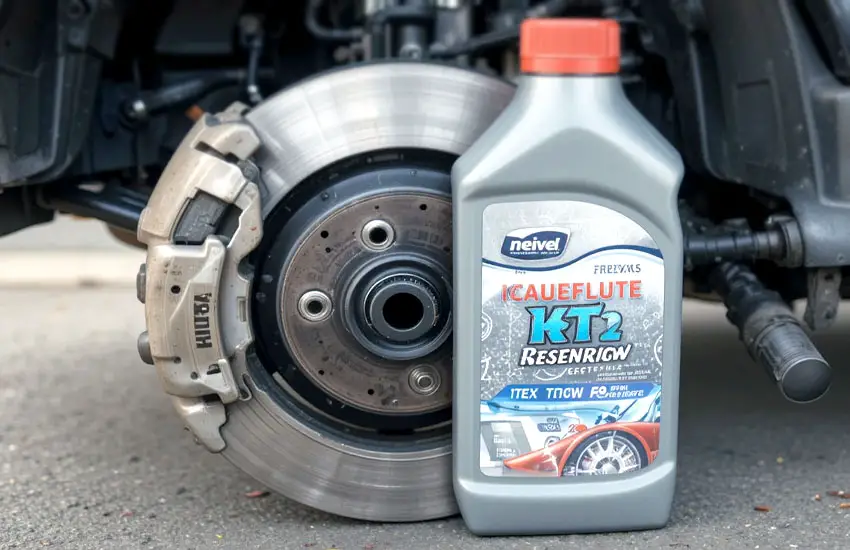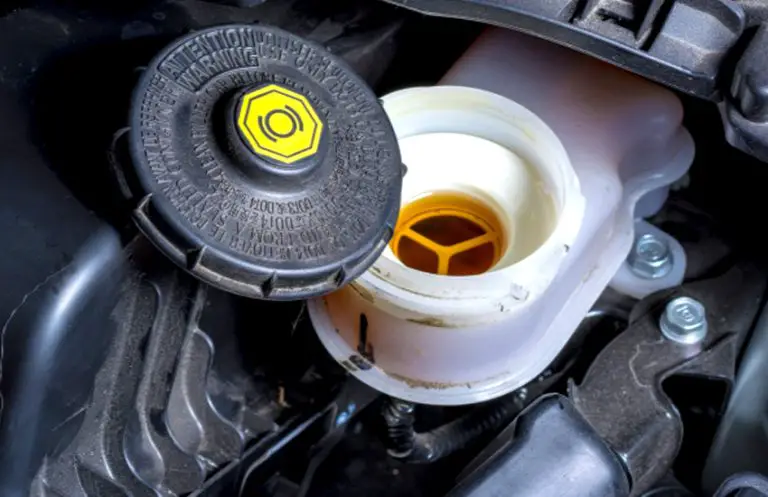Eczema is a common and frustrating condition that leaves many of us searching for effective treatments. You’ve probably heard all sorts of unconventional ideas about cures, but one that stands out is brake fluid. Yes, you read that right! Brake fluid has been rumored to help manage eczema symptoms. But is there any truth to it, or is it just another myth? Let’s dive in and explore whether brake fluid is effective for eczema treatment.

What is Eczema and How Does it Affect the Skin?
Eczema, also known as atopic dermatitis, is a condition where the skin becomes inflamed, itchy, and often red. It’s a chronic condition that can flare up from time to time, causing significant discomfort. The skin’s barrier becomes weak, which makes it easier for irritants and allergens to cause irritation. Eczema can occur anywhere on the body, but common areas include the elbows, knees, face, and hands. In some cases, it can even cause the skin to crack and bleed, making it even more painful.
While eczema is often associated with children, it can affect people of all ages. It’s thought to be related to a mix of genetic and environmental factors, though the exact cause is still not fully understood. There’s no cure for eczema, but there are ways to manage and treat the symptoms. The treatment options usually focus on moisturizing the skin and reducing inflammation.
Many people turn to topical creams, prescription medications, and natural remedies to manage their eczema symptoms. However, the search for new solutions can lead to bizarre suggestions, and one of these is using brake fluid to treat eczema. So why would anyone think that brake fluid, of all things, could help with a skin condition? Let’s investigate.
The Surprising Claim: Brake Fluid for Eczema Treatment
The idea of using brake fluid for eczema treatment has been circulating on the internet for years. Some anecdotal reports and personal experiences suggest that it may provide relief for people suffering from the itch and inflammation that comes with eczema. The claim is that brake fluid’s chemicals can help soothe the skin and reduce irritation, much like certain chemical treatments used in medicine.
But before jumping to conclusions, it’s important to understand what brake fluid is and how it works. Brake fluid is a type of hydraulic fluid used in the brake systems of vehicles. It’s designed to transfer force into pressure to make the brakes work. There are two types of brake fluid: DOT (Department of Transportation) and mineral-based brake fluids. Brake fluid is typically made of glycol or silicone-based compounds, which are not intended for contact with skin.
When it comes to eczema, the theory behind using brake fluid lies in its ability to create a barrier on the skin. The idea is that it might help seal the skin and prevent irritants from getting in. Some people believe this barrier helps moisturize dry, cracked skin, making it feel smoother and less irritated. However, it’s crucial to note that this is purely anecdotal and hasn’t been scientifically proven.
Why You Should Be Careful with Brake Fluid for Eczema
The use of brake fluid for eczema might seem tempting, especially if you’ve tried numerous treatments that didn’t work. However, it’s important to exercise extreme caution when considering this remedy. Brake fluid is not designed for skin contact, and its chemical composition is not suitable for treating a skin condition like eczema.
Brake fluid contains harsh chemicals such as glycol ethers and other additives that can be toxic to the skin. These chemicals are designed to withstand high temperatures and maintain performance in a brake system, but they can cause irritation, burns, or allergic reactions when applied to the skin. Applying brake fluid to your eczema could lead to a range of potential issues, including worsening inflammation, redness, or even an allergic reaction that could make your eczema much worse.
Additionally, brake fluid is not formulated to be absorbed by the skin. It can form a thick layer that sits on top of the skin, potentially clogging pores or making the skin more prone to infections. People with eczema already have compromised skin barriers, so adding brake fluid might not be the best idea. Instead, there are many other treatments specifically designed for eczema that can provide safer and more effective results.
Alternatives to Brake Fluid: Safe and Effective Eczema Treatments
If you’re looking for relief from eczema, there are plenty of safer and more reliable treatments available. While brake fluid may seem like a quick fix, it’s far from an ideal solution. Let’s explore some of the proven alternatives that are both safe and effective.
Moisturizers and Hydrating Creams
Moisturizing is key to managing eczema. Keeping the skin hydrated can help strengthen the skin barrier and reduce dryness, itching, and irritation. Look for thick, fragrance-free creams that are designed for sensitive skin. Ingredients like ceramides, glycerin, and hyaluronic acid can help lock in moisture and repair the skin’s natural barrier. A good moisturizer should be applied immediately after bathing when the skin is still damp for maximum effectiveness.
Topical Steroid Creams
For more severe eczema flare-ups, topical steroid creams are commonly prescribed by doctors. These creams help reduce inflammation, redness, and swelling, providing quick relief for irritated skin. However, steroid creams should be used with caution as long-term use can lead to side effects, such as thinning skin or stretch marks. It’s important to follow your doctor’s advice regarding the frequency and duration of use.
Anti-itch Creams
Itching is one of the most annoying symptoms of eczema, and there are a variety of anti-itch creams available over-the-counter. Look for products containing hydrocortisone, calamine, or colloidal oatmeal. These ingredients can help reduce itching and soothe the skin. Applying them directly to the affected areas can help make the eczema less bothersome and allow you to focus on other aspects of your day.
Natural Remedies for Eczema
If you prefer natural treatments, there are a number of remedies that can help alleviate eczema symptoms. Coconut oil is a popular option for moisturizing the skin and has been shown to have anti-inflammatory properties. Aloe vera gel can also help cool the skin and reduce irritation. Oatmeal baths are another soothing option, as oatmeal is known to help calm itchy skin and reduce redness.
Antihistamines
In some cases, eczema can be triggered by allergies. If you suspect that allergies are playing a role in your eczema flare-ups, antihistamines may help. These medications can block the release of histamine, a substance that triggers allergic reactions. By reducing histamine levels, antihistamines can help alleviate itching and redness associated with eczema.
Prescription Medications and Biologic Drugs
For severe cases of eczema, doctors may recommend prescription medications or biologic drugs. These medications work by targeting the underlying immune response that causes eczema flare-ups. Biologic drugs, such as Dupixent, are often prescribed to people with moderate to severe eczema who don’t respond well to traditional treatments. While these medications can be highly effective, they are typically reserved for individuals who have not found relief with other treatments.
The Bottom Line: Brake Fluid and Eczema Don’t Mix
While it’s tempting to try out new and unusual treatments, brake fluid should not be one of them when it comes to eczema. The risks associated with applying brake fluid to your skin far outweigh any potential benefits. There are many other tried-and-true treatments that are specifically designed for eczema, offering safer and more effective results.
If you’re struggling with eczema, it’s important to speak with a healthcare professional who can help you find the right treatment for your condition. A doctor or dermatologist can recommend prescription medications, creams, or natural remedies that are better suited to your skin type and severity of eczema. Don’t risk your health by turning to unsafe alternatives like brake fluid—stick with products that are proven to be effective and safe.
I hope this helps you eliminate those pesky eczema flare-ups and find the relief you deserve! Eczema can be a tough condition to manage, but with the right treatment plan, it’s possible to keep it under control.
Are These Questions in Your Mind?
Is it safe to use brake fluid for skin conditions like eczema?
No, brake fluid contains harsh chemicals that can cause irritation or allergic reactions on the skin. It is not designed for skin use and can make eczema worse.
Can brake fluid help with eczema flare-ups?
There is no scientific evidence to support the idea that brake fluid can treat eczema. In fact, it may cause further harm to the skin.
Do I need a prescription for eczema medication?
For mild eczema, over-the-counter treatments may be sufficient, but for more severe cases, a doctor may prescribe topical steroids or other medications.
Is it common to have eczema in adults?
Yes, although eczema is often diagnosed in childhood, adults can develop eczema or experience flare-ups of childhood eczema as they get older.
Can eczema be cured permanently?
There is currently no permanent cure for eczema, but it can be managed effectively with proper treatment and care.
Is it okay to use natural remedies for eczema?
Natural remedies like coconut oil, aloe vera, and oatmeal can be beneficial for eczema, but they should be used in combination with medical treatments for optimal results.
Do antihistamines help with eczema itching?
Yes, antihistamines can help reduce itching associated with eczema, especially if allergies are a trigger.
Is it safe to apply hydrocortisone to eczema?
Hydrocortisone creams can be helpful for treating eczema, but they should be used according to your doctor’s advice, as prolonged use can cause side effects.
Can diet affect eczema flare-ups?
Yes, certain foods, especially those that trigger allergies, can cause eczema flare-ups. Keeping a food diary and identifying triggers can be helpful.
Is it necessary to use moisturizer daily for eczema?
Yes, daily moisturizing is essential for managing eczema. It helps maintain the skin barrier and reduces dryness and irritation.


